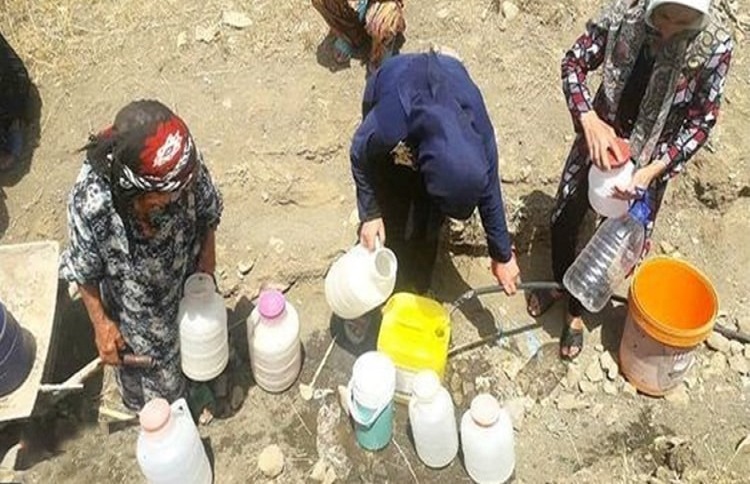
By Jubin Katiraie
While the need for water for health purposes has doubled with the continuing situation of the coronavirus outbreak in Iran, with the onset of the hot season, the problem of water scarcity in various provinces and cities of Iran has arisen.
Water scarcity, among other dangers, exposes the country to more coronavirus infections.
A few days ago, the alarm was sounded about the serious water shortage crisis in Khorasan Razavi province. Mohammad Reza Hashemi, the governor of Mashhad, announced on 2 June that “140 villages in Mashhad are deprived of drinking water.”
Hashemi added, “Residents of 140 villages, out of a total of 220 villages in the city covered by the services of the Water and Sewerage Company, are currently facing difficulties in supplying drinking water.”
Hashemi, referring to “high deprivation in different parts of the city and its share of more than 50 percent of the total population of Khorasan Razavi province,” said that “Mashhad’s share of provincial credit is only 24 percent.”
Khorasan Razavi is not the only province where there are reports of water shortages. Rafsanjan, Qazvin, Tehran, Karaj, Bushehr, Javanroud, Pol-e Dokhtar, Aran and Bidgol were among the cities whose residents faced water shortage problems in the last week.
Hossein Charkhandaz the CEO of ABFA Rafsanjan, on 1 June said: “Rafsanjan is currently facing a shortage of 150 liters of water per second, and the outbreak of the coronavirus has affected high water consumption.”
Also, on this day, Mehdi Hossein Khani, the deputy head ABFA in the Qazvin province, said: “The shortage of water in Qazvin is serious.”
Hassan Haghighi, the CEO of Tehran Water and Sewerage Company, District 6, also announced a serious water shortage in Hassanabad Fashafoyeh on this day.
On 27 May, Mohammad Reza Ahmad Nasab, the deputy director of the Tehran Province Water and Sewerage Company, stated that “water shortages in the capital are very serious.”
Zolfaqar Mehdizadeh, CEO of the ABFA Alborz Water Supply and Sewerage, also announced on 31 May that water pressure had dropped and was in short supply, especially in the Golshahr and Mehrshahr areas of Karaj.
News of water shortages in the cities of Bushehr, Javanroud, Pol-e Dokhtar, Aran and Bidgol, etc., has made headlines in recent days.
The main water crisis prompted the people of Gheyzaniyeh, 45 km from Ahvaz, to block the Ahvaz-Ramhormoz-Omidiyeh road on 3 June. But the authorities’ response to the people’s demand for water was just bullets.
While more than 300 oil wells are located in the Gheyzaniyeh region and the region’s largest oil facilities are located there, the people of this region are the most deprived people in Iran’s Arab regions and are deprived of safe drinking water. Gheyzaniyeh’s oil output is five times that of Bahrain.
In Khuzestan, it is not only the people of Gheyzaniyeh who are struggling with the problem of water shortage. In Tageh 3 village, in the vicinity of Abadan city, with a population of more than 1500 people and 375 families, has for several years faced a shortage of water pressure, and in the last six months, the water in this village has been completely cut off.
The Chooebdeh city near Abadan is also struggling with water shortage. According to residents, they have been struggling with this problem for thirty years, but during these years no action has been taken to solve this problem, and the refinery, which has been under construction for many years, has been left unfinished.
The problem of water scarcity goes back to before the start of the summer season, contrary to what officials say. Sohrab Bahrami, the director-general of Chaharmahal and Bakhtiari Rural Water and Sewerage announced on 14 April, that the water supply is being taken tankers to 40 villages in the province.
In addition to the coronavirus outbreak, of course, there are other threats to citizens who are struggling with water shortages. Seyed Mohammad Alavi, the head of the Khuzestan Health Center, referring to the lack of water in Gheyzaniyeh and other villages in Khuzestan, said: “Residents of this area may develop intestinal diseases.”
Referring to the problems of water shortage in the Gheyzaniyeh section of Ahvaz, Alavi added: “The problem of drinking water in villages and some suburbs is not a problem for one or two years; It has been for a long time… The water problem is not just in Gheyzaniyeh; Because the Gheyzaniyeh’s problem has been reported in the media, it has become more apparent, however, many villages in Khuzestan have unhealthy drinking water and there is no control over their water. Most rural areas in Khuzestan have water and sewage problems.
Read More:


